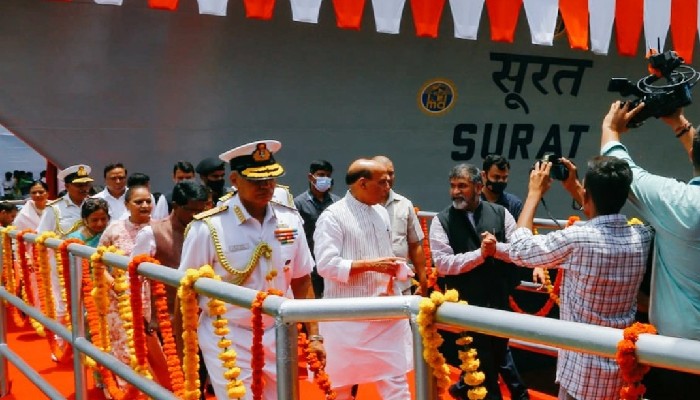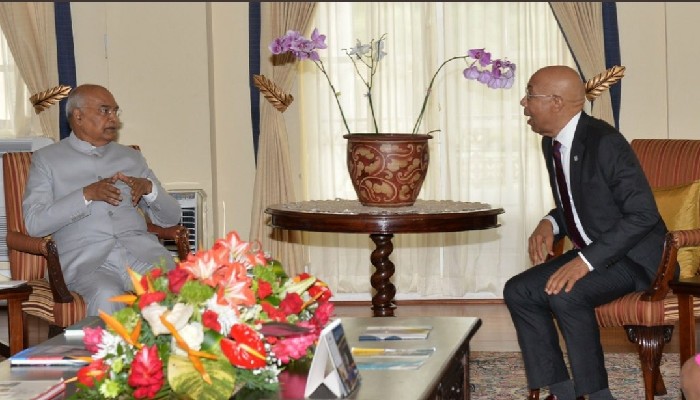The shared bonding of fighting against colonialism is a deeply emotional one, S Jaishankar said
India-Africa relations are truly deep rooted and go back into the recesses of history, External Affairs Minister S Jaishankar said on Tuesday.
Pointing out that shared experiences of oppression generated a common desire for freedom and independence, he said, "This shared bonding of fighting against colonialism is a deeply emotional one, very difficult to explain to those who have not gone through it".
Jaishankar was speaking at the launch of Ambassador Rajiv Bhatia’s book “India-Africa Relations: Changing Horizons”.
"It explains the solidarity that we intuitively express at global platforms, whether it was the issue of African independence itself, the battle against apartheid, the continuing debate on fair and just development, or more recently, the inequities of the pandemic response. It is also a reason why, even when our own resources and capabilities were much more meagre, we embarked on a development partnership with Africa," EAM Jaishankar pointed out.
According to EAM Jaishankar, India’s vision of cooperation with Africa will increasingly centre around health, digital and green growth. "And this is so because we believe that these are Africa’s priorities as well," he remarked.
"We envisage our African partners as critical to two important international initiatives spearheaded by India: the International Solar Alliance and the Coalition for Disaster Resilient Infrastructure," he added.
Speaking on the current state of ties between India-Africa, Jaishankar said a steadily developing relationship between the two was rapidly taken to a much higher level once Prime Minister Narendra Modi came to the helm of affairs in India in 2014.
He pointed out that since 2014, there have been 34 outgoing visits by India's President, Vice-President and Prime Minister to Africa.
"At the same time, there have been more than 100 incoming visits from Africa. In many cases, such high-level interactions are taking place after multiple decades," he noted.
Trade and Investment
According to EAM Jaishankar, India is the fourth largest partner for Africa registering trade of USD 69.7 billon during 2018-19. The Duty Free Tariff Preference (DFTP) Scheme announced by India has benefited African nations by extending duty free access to 98.2% of India’s total tariff lines.
The African Continental Free Trade Area (AfCFTA) which came into force in January 2021 is expected to enhance our trade volumes, he added.
Where investment is concerned, he noted, India ranks fifth with a cumulative commitment of USD 70.7 billion. Indian industry has made sizeable commitments in oil and gas, mining, banking, textiles, automotive and agriculture, etc. Several Indian companies and brands have made Africa their second home and are offering their products and services all across the continent, he added.
He stressed that the Indian diaspora can play a crucial bridging role particularly when it comes to economic engagement.
Referring to the stresses from the knock-on effects of the Ukraine conflict, he said India and Africa can come together in the building of reliable and resilient supply chains.
Defence and maritime security
Referring to cooperation in defence and maritime security, EAM Jaishankar said India was associated with the establishment of defence institutions in Nigeria, Ethiopia and Tanzania. Indian military training teams have worked with their counterparts in Botswana, Lesotho, Zambia, Uganda, Namibia, Tanzania, Mauritius and Seychelles, he added.
"Our growing maritime security cooperation is centred around Mauritius and Seychelles, but now extends to coastal African nations as well. Challenges of anti-piracy, counter-narcotics and counter-terrorism are increasingly visualized as a shared problem," he pointed out.
"We are very conscious of the expanding threats posed by radicalism and fundamentalism and terrorism to African societies. These have been the subject of our contemporary agenda of cooperation," EAM Jaishankar noted.
"When it comes to political issues, we share the frustration of international organizations being unrepresentative of contemporary reality. That this has made them increasingly ineffective is of little consolation," he pointed out.
According to EAM Jaishankar, India believes that Africa must have an adequate presence and voice in global decision-making, including in the reformed UN Security Council. "And in turn, we count on Africa to stand up for a partner with whom it has a past, a present and a future," he added.
 Contact Us
Contact Us  Subscribe Us
Subscribe Us









 Contact Us
Contact Us
 Subscribe
Subscribe
 News Letter
News Letter

